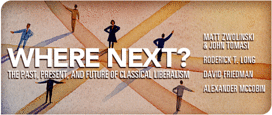You offer a quote from Hayek which you say “affirms the importance of ‘social justice.’” The quote, however, refers to “justice,” not to “social justice,” and in the next sentence, which you do not quote, Hayek explicitly rejects the latter term.
You describe the “veil of ignorance” argument as being first proposed by Hayek and then, decades later, by Rawls. The passage you cite was published five years after Rawls published A Theory of Justice; your earlier date is the date at which Hayek says he started thinking about the idea, not the date at which he proposed it. It was not Hayek but Harsanyi who proposed the veil of ignorance almost two decades before Rawls. Unlike Rawls, Harsanyi followed the logic of the argument to where it led—judging a society by its average utility.
You ask “what sorts of social systems tend to help people, to make the best of people’s creative capacities, and to encourage the tide of wealth to rise high, so that even the lowest paid workers do well?” Is the “so that even” clause intended as an essential criterion for a good society or merely an observation about one of the attractive features of a society that maximizes utility?
In various places, you refer to “concern for the poor.” Do you mean “concern especially for the poor?” For the Rawlsian, the poor occupy a special position. For the utilitarian, the poor count, but only in the same sense that everyone else counts. Those are two quite different positions, and you never clearly distinguish between them. That is particularly disturbing, considering that it is the first which you appear to be advocating but the second that is historically linked to libertarianism.
What does “social justice,” as you use the term, mean—what does “social” add to “justice?”
I can see three possible arguments for including social justice within libertarianism. The first is historical—but, while you have offered evidence that classical liberals cared about things other than rights, you have offered no evidence that they were especially concerned about the one thing—the status of the poor—that defines social justice as the term is currently used. The second is philosophical—but you have agreed that Rawls’ derivation is unsatisfactory, and you have offered no alternative.
The third is to make libertarianism more persuasive to non-libertarians, especially liberal academics. To do that, you need some version of social justice that is both consistent with libertarian principles and sufficiently robust to satisfy liberals. Nozick’s version of the Lockean Proviso is about as close as you are going to come, and I do not think it will do the job. His “baseline” is how well off people would be in a world without private property in land. Would you consider your concerns with social justice satisfied by a world in which the poorest people received an income of a thousand dollars a year, almost everyone else at least a hundred thousand?
Do you think the people whom you hope to persuade by arguing that libertarians, too, are concerned with social justice would consider that such a world satisfied their concerns?

